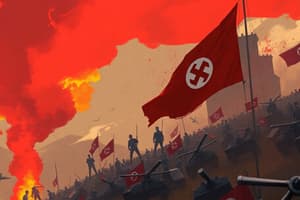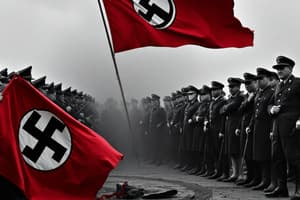Podcast
Questions and Answers
Which event is considered a pivotal moment in the European theater during World War II?
Which event is considered a pivotal moment in the European theater during World War II?
- The Battle of Midway
- D-Day (correct)
- The Battle of Stalingrad
- The Attack on Pearl Harbor
What technological innovation had a significant impact on maritime warfare during World War II?
What technological innovation had a significant impact on maritime warfare during World War II?
- The development of advanced aircraft
- The tank
- The Blitz
- The radar (correct)
Which country led the Allied forces in the Pacific theater against imperial Japan?
Which country led the Allied forces in the Pacific theater against imperial Japan?
- Soviet Union
- United Kingdom
- Germany
- United States (correct)
What was the systematic, state-sponsored persecution and murder of millions of Jews, Roma, and others by the Nazi regime known as?
What was the systematic, state-sponsored persecution and murder of millions of Jews, Roma, and others by the Nazi regime known as?
When did Germany surrender during World War II?
When did Germany surrender during World War II?
What global organization was created as a result of World War II?
What global organization was created as a result of World War II?
What were the two totalitarian regimes that emerged during the interwar period?
What were the two totalitarian regimes that emerged during the interwar period?
Which leader aimed to create a 'master race' and expand Germany's territory?
Which leader aimed to create a 'master race' and expand Germany's territory?
What event in 1939 triggered Britain and France to declare war on Germany?
What event in 1939 triggered Britain and France to declare war on Germany?
Which countries formed the Axis Powers during World War II?
Which countries formed the Axis Powers during World War II?
Where did major theaters of war occur during World War II?
Where did major theaters of war occur during World War II?
Which country was not part of the Allies during World War II?
Which country was not part of the Allies during World War II?
Flashcards are hidden until you start studying
Study Notes
World War II: A Pivotal Moment in Global History
World War II (1939-1945) was a tumultuous period that indelibly shaped our world. This conflict, which involved multiple continents and millions of people, was a cataclysmic event that left an enduring legacy. Here we delve into the key elements and events of this pivotal chapter in human history.
The Rise of Totalitarianism
The interwar period saw the emergence of two totalitarian regimes: the National Socialist German Workers' Party (Nazi Germany) and the Union of Soviet Socialist Republics (USSR). The Nazi Party, under Adolf Hitler's leadership, sought to create a "master race" and expand Germany's territory, while the USSR, under Joseph Stalin, aimed to spread Communism and extend its sphere of influence.
Aggression and Alliances
The war's roots lie in acts of aggression by Nazi Germany. In 1938, Hitler annexed Austria, and in 1939, he invaded Poland, setting off a chain reaction of events. Britain and France declared war on Germany in response to these actions. Before long, a global conflict emerged as the United States, the Soviet Union, and many other countries joined the fight.
Alliances also played a significant role in the war. The two main coalitions were the Axis Powers (Germany, Italy, and Japan) and the Allies (Britain, France, the Soviet Union, and the United States).
The Battlefronts
Conflict unfolded across multiple fronts, with the major theaters of war including Europe, North Africa, and the Pacific. In Europe, the Western Front saw Allied forces battle the Axis powers, with D-Day (June 6, 1944) as a pivotal moment in this campaign. Meanwhile, the Eastern Front witnessed the largest military conflict in history, with the Soviet Union fighting Germany. In the Pacific, the United States led the Allied forces against imperial Japan.
Technological Innovations
World War II saw many technological innovations, with some of the most significant being military. For instance, the tank revolutionized land warfare, while radar and the submarine transformed maritime warfare. In the air, the development of advanced aircraft, including the Spitfire and Messerschmitt Bf 109, greatly impacted the outcome of battles.
The Holocaust
The Holocaust was a systematic, state-sponsored persecution and murder of millions of Jews, Roma, homosexuals, and others by the Nazi regime. Estimated to have claimed the lives of approximately 6 million Jews, the Holocaust remains one of history's darkest moments.
The Home Fronts
The war also had a profound impact on the home fronts of participating countries. In the United States, for example, the war effort led to a significant increase in industrial production and the involvement of women in the workforce. In Britain, the Blitz demonstrated the resilience of the population in the face of adversity.
The Allies' Victory
The Allies ultimately emerged victorious from the conflict. The surrender of Germany in May 1945 and Japan's surrender in September 1945 marked the end of World War II. The war had a profound impact on the world, leading to the creation of the United Nations and the beginning of the Cold War.
Conclusion
World War II was a pivotal moment in global history that profoundly shaped the world we live in today. The conflict left an indelible mark on society, with its legacy continuing to be felt in politics, economics, and culture. It serves as a reminder of the consequences of aggression and the importance of cooperation and unity in a globalized world. As we reflect on the lessons of World War II, may we strive to build a better future by avoiding conflicts and fostering peace, justice, and equity.
Studying That Suits You
Use AI to generate personalized quizzes and flashcards to suit your learning preferences.




